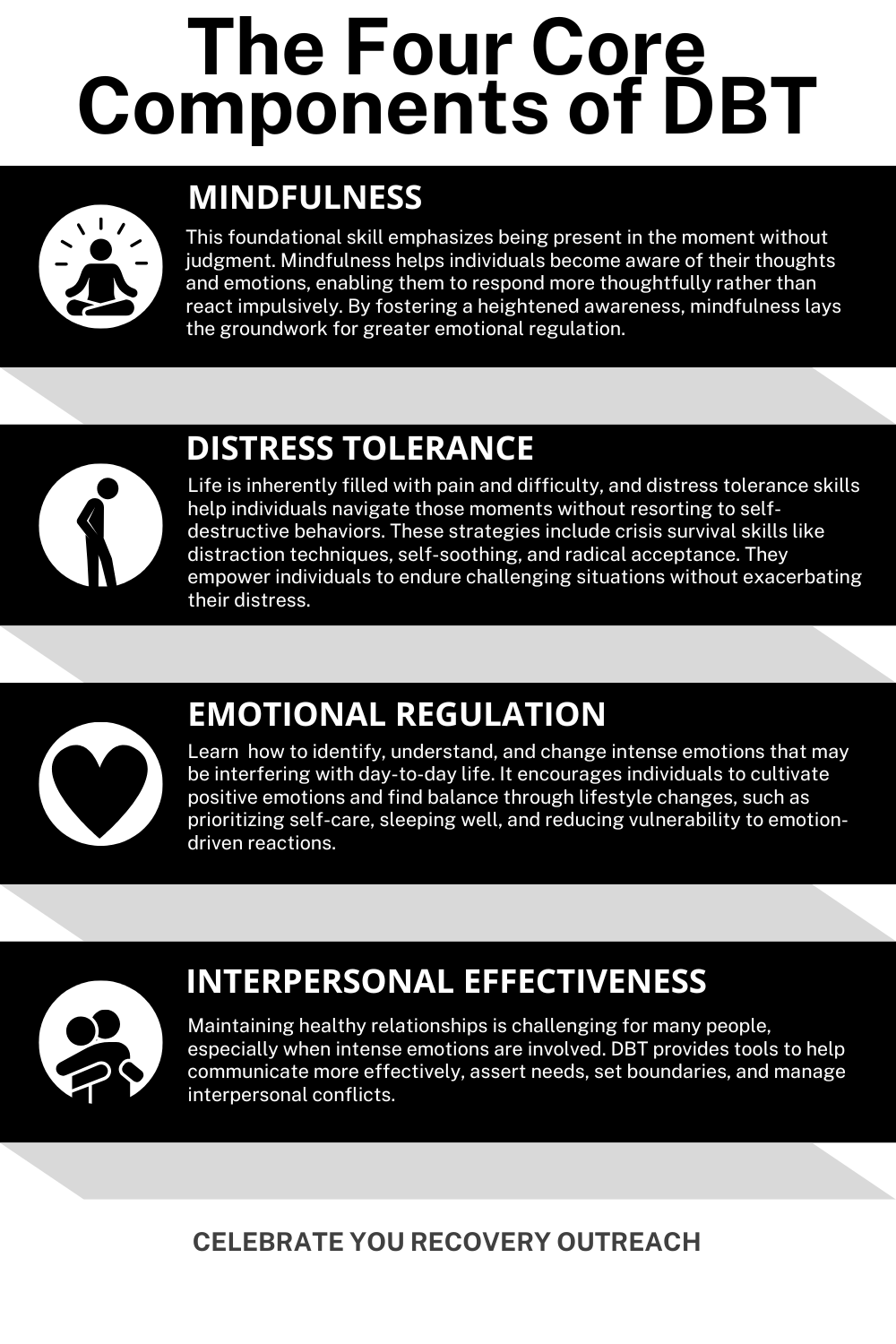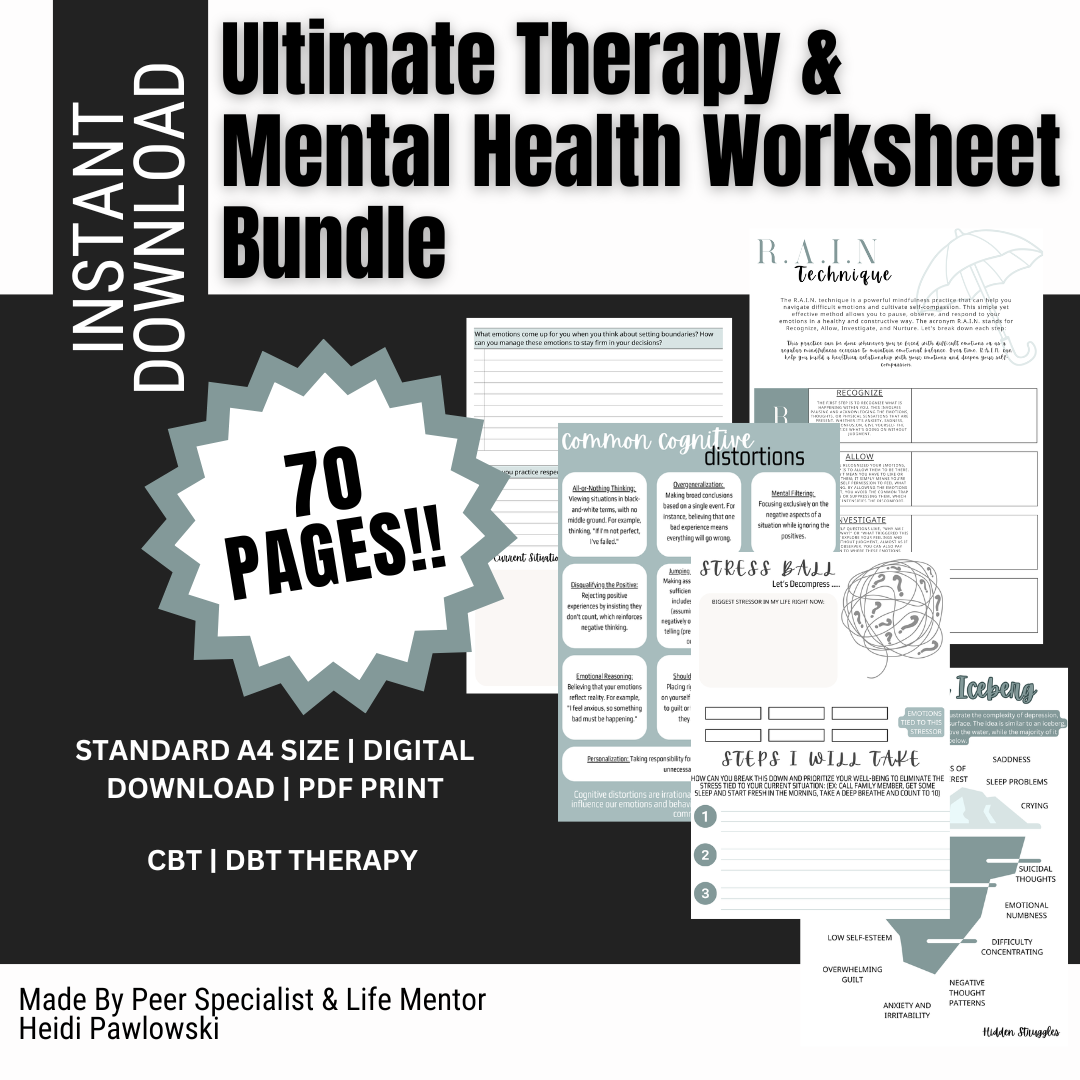How Dialectical Behavior Therapy (DBT) Can Help You Achieve Long-Term Sobriety (& Improve Overall Well-being)
Learning to get my emotions in check was definitely a noticeable turning point in my recovery. Not easy and definitely didn’t happen overnight.
By making necessary changes and faithfully implementing new ways of thinking, I was able to better regulate my emotions. Better emotional regulation resulted in long-term sobriety and overall improved mental health.
For countless years, I struggled with a long list of self-destructive behaviors (Substance abuse, alcoholism, self-harm, depression, anxiety). My emotions and I how I was unable to correctly process or work through them put me on an endless cycle of ruin.
The first time I was introduced to DBT Therapy was back in 2019 while I was in the Taylor County Drug Treatment Court Program. The skills I learned while in this program helped me tremendously. DBT therapy has not only helped me confront overwhelming emotions but also taught me sustainable strategies to manage them.
What Is DBT?
Dialectical Behavior Therapy (DBT) is a specialized form of cognitive-behavioral therapy (CBT) developed by psychologist Dr. Marsha Linehan.
Originally designed to treat individuals with borderline personality disorder (BPD), DBT has expanded over the years to address a variety of mental health challenges. Its structured, skills-based approach equips individuals with the tools to regulate intense emotions, improve relationships, and navigate life more effectively.
DBT blends cognitive-behavioral techniques with mindfulness practices rooted in acceptance strategies. The term “dialectical” refers to the integration of opposing concepts—acceptance and change.
This dual focus allows individuals to acknowledge their current emotional state while working towards meaningful change. DBT aims to help people understand and accept their feelings while teaching them actionable skills to manage distress and develop healthier coping mechanisms.
How Can DBT Help?
DBT offers practical strategies to regulate overwhelming feelings and reduce emotional suffering. By understanding the root of your emotional triggers, you will be able to break the cycle of emotional highs and lows.
Many people who seek DBT are dealing with harmful behaviors such as self-harm, substance abuse, or disordered eating. DBT provides alternative coping strategies that help break these cycles and promote healthier habits.
DBT equipped me with the communication and relationship skills needed to interact effectively with others. This is can be particularly beneficial for those who struggle with unstable or tumultuous relationships.
For those prone to crisis situations or those with limited tolerance for distress, DBT teaches a range of coping strategies to handle difficult moments without resorting to self-destructive actions.
What Conditions Can DBT Help With?
DBT is effective in treating a wide range of mental health issues, including but not limited to:
Borderline Personality Disorder (BPD): DBT’s original focus was on helping individuals with BPD manage severe emotional dysregulation, impulsivity, and identity disturbances.
Depression and Anxiety Disorders: For those with persistent depressive and anxiety symptoms, DBT offers skills to manage negative thought patterns and emotional reactivity.
Substance Use Disorders: The distress tolerance and emotion regulation components of DBT help individuals with substance use disorders develop healthier coping mechanisms.
Post-Traumatic Stress Disorder (PTSD): The acceptance-based skills in DBT can aid in processing trauma and reducing the intensity of triggers and flashbacks.
Eating Disorders: DBT’s structure can be used to interrupt the cycle of disordered eating and develop more adaptive ways of dealing with stress and emotions.
Self-Harm and Suicidal Behavior: DBT’s comprehensive, skills-based approach has been shown to reduce behaviors related to self-harm and suicide.
Benefits of DBT Therapy
DBT therapy is typically delivered in both individual and group settings, which reinforces skills learned and provides ongoing support. Group sessions allow individuals to practice these skills in a safe environment, while one-on-one therapy offers personalized feedback and guidance.
Key benefits include:
Increased emotional resilience
Improved ability to handle stress
Healthier interpersonal relationships
Reduction in self-destructive and impulsive behaviors
Enhanced sense of self and purpose
DBT empowers individuals to embrace life’s challenges with greater confidence and balance. If you or someone you know is grappling with emotional regulation issues or destructive behavior patterns, DBT can be a powerful ally on the road to recovery and improved well-being.
For those interested in starting DBT, reaching out to a licensed therapist trained in DBT or joining a DBT group can be a crucial first step toward building a toolkit of skills for a more balanced and fulfilling life.
At Celebrate You we are dedicated to helping you along every part of your journey! If you're ready to integrate the powerful strategies of DBT and other mental health tools into your life, I invite you to download our exclusive Mental Health Worksheet Bundle. This bundle is packed with countless exercises designed to help you work through and manage your emotions effectively—tools that I have personally used on my own journey toward emotional resilience and healing.
CLICK HERE TO DOWNLOAD
Why This Bundle?
Comprehensive Tools: From mindfulness practices to emotion regulation exercises, these worksheets provide step-by-step guidance to implement strategies discussed in DBT and beyond.
Convenient and Reusable: Once downloaded, you can print and reuse these worksheets as often as needed, making them a flexible, lasting addition to your self-care routine.
Personal Integration: These tools have been tested and integrated into my life, so I know firsthand how powerful they can be in nurturing emotional well-being.
Don’t wait to start taking control of your mental health. Download Here!!
Take this small but meaningful step toward a more balanced and empowered life.
Have you experienced success with DBT therapy? What strategies or exercises have made a difference in your life? I invite you to share your thoughts and insights in the comments below. Your story and experiences could provide valuable support and encouragement to others who are navigating their own journeys with DBT or emotional regulation.
Whether it's a helpful tip, a personal breakthrough, or words of advice, your contribution could be the key that helps someone else.





